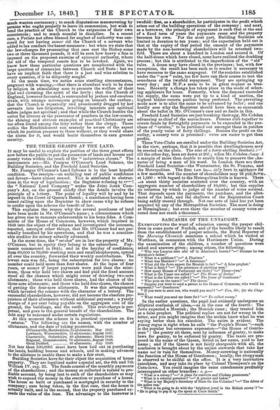SARCASMS OF THE UNTAUGHT.
EXEMPLIFYING the want of education among the pauper chil-
dren in some parts of Norfolk, and of the benefits likely to result from the establishment of pauper schools, the Rural Reporter of
the Morning Chronicle mentions a school which he visited at Worthamt in connexion with the Hartismere Union. During
the examination of the children, a number of questions were asked and answers given ; among others, the following.
" Why was Lazarus seen afar off in Abraham's bosom? "—" Because he was
Abraham's father."
" What is a publican?"—" A Pharisee."
" What was Matthew? "—" A fisherman."
" What did the Jews expect the Messiah to be? "—" A false prophet." " What is faith ? "—" The substance of anything seen." " How many Houses of Parliament are there ?"—" Three—two."
" What is the Upper one called ?"—" The House of Dukes." " What is the Lower one called? "—" The house of Gentlemen."
" Who pats on the taxes?"—" The Queen."
" Suppose you were to send a person to the House of Commons, who would he
represent? "—" Gentlemen." " If you were to send one, who would you send 2 "—" You, Sir, (to the Chap-
lain.)
" What would you send me there for? "—" To collect money."
In the earlier questions, the pupil had evidently undergone an elliptical confusion of ideas,—as in the case of the fourth : The Jews expected a Messiah; the Messiah came ; they treated him as a false prophet. The political replies are not far wrong in the letter, and you might imagine that the urchin knew what he was saying better than his catechist. The satire is evident. The young rogue is right when he calls "the People's House "—such is the popular but erroneous expression—" the House of Gentle- men" : the gentry sit there, sent by influence of gentry, to make laws for gentry, to be enforced by gentry. The taxes are pro- posed in the name of the Queen, levied in her name, paid to her name ; and if the Queen is not fairly chargeable with all, the confusion is brought about by the unjust stewards that take her name not in vain for themselves. Money-screwing is nationally the function of the House of Gentlemen ; locally, the clergyman is observed to be skilful at the office. It is a very instructive catechism, and may take its place by Colonel Thompson's on the Corn-laws. You could imagine the same catechumen profitably interrogated on other branches : e. g.- " What is a colony ?"—" A place for convicts and Chelsea pensioners."
" What is a colonial governor? "—" A grazier and baker."
" What is her Majesty's Secretary of State for the Colonies?"—" The driver of the police van." " What is he going to do with the brightest jewel in the British crown'?"— "He is going to pop it up the spout at Uncle Sam's."


























 Previous page
Previous page